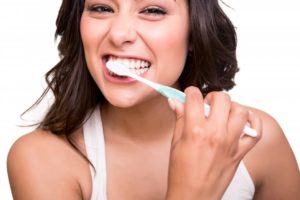
It’s important to brush twice a day and be as thorough as possible, but did you know that improper brushing can actually harm your teeth and gums far more than help them? One of the most common ways people do this is by brushing too long, too hard, and improper brushing techniques. Without making changes, your gums are at significant risk of long-term damage, according to your periodontist in Frisco.
Here’s how you put your entire mouth at risk.
What Can Toothbrush Abrasion Cause?
Over the last few decades dentists advocated the use of soft bristle toothbrushes. Clinical studies showed that aggressive brushing with a hard bristle toothbrush led to scraping away of your gum tissue and root surface exposure; this inevitably created lingering sensitivity to foods, drinks, and cold air. We have now learned that abrasive toothpastes, such as those labels that include “whitening,” may also lead to gum recession and irreversible damage to your enamel.
Whether you’re brushing with too much force, using the wrong brush, or using the wrong toothpaste, toothbrush abrasion can have serious and possibly irreversible consequences. The abrasion wounds caused by toothbrushes and toothpastes can cause gum recession, which is a condition where the gums pull away (gums have been thinned and scraped away from the tooth) and expose more of the tooth. Receding gums also expose the tooth roots, which are far more susceptible to sensitivity sensations and cavities.
How Do I Know If I’m Damaging My Mouth?
While plaque can cause significant damage, it doesn’t require much force in order to remove. To give you an idea of how much pressure to use, hold your toothbrush with only your thumb and first two fingers while brushing. This is sufficient enough to remove plaque, so brushing harder is only going to cause damage. A common sign of excessive pressure is the sign of toothbrush bristles fraying/bending. Replacing your toothbrush every 3-4 months is necessary to prevent adverse homecare destructions.
What Changes Do I Need to Make?
The best way to prevent toothbrush abrasion is to pay close attention to how much force you’re currently applying. Instead of brushing back and forth vigorously, try brushing in smaller, controlled circles to reduce your force. This will produce a “jiggling” force rather than an actual brushing force so commonly associated with recession. Alternatively, you can purchase either a rotating/oscillating electric toothbrush or a sonic toothbrush. Both encourage users to apply light pressure since the brush itself does most of the work. Some of these “electric toothbrushes” have a built in sensor to train the user of improper pressure.
If you’d rather stick with a manual toothbrush, make sure to pay attention to the bristles. The bristles should always be soft to the touch and not frayed. Frayed brushes only become harder over time, increasing the risk of abrasion.
According to your periodontist, good technique revolves around reaching all the areas of the mouth, not just brushing with force. The more dedicated you are to being thorough, the more likely you’ll avoid developing gum disease and wearing down enamel.
Want more tips on avoiding gum disease in Frisco as well as other conditions? Schedule an appointment today to keep dental disease at bay!
About the Author
Dr. Zachary Carnow earned his dental degree from the University of the Pacific Arthur A. Dugoni School of Dentistry. Today, he’s a board-certified periodontist with extensive knowledge on treating and managing the most complex gum disease cases. To learn more about his practice, contact him through his website.
